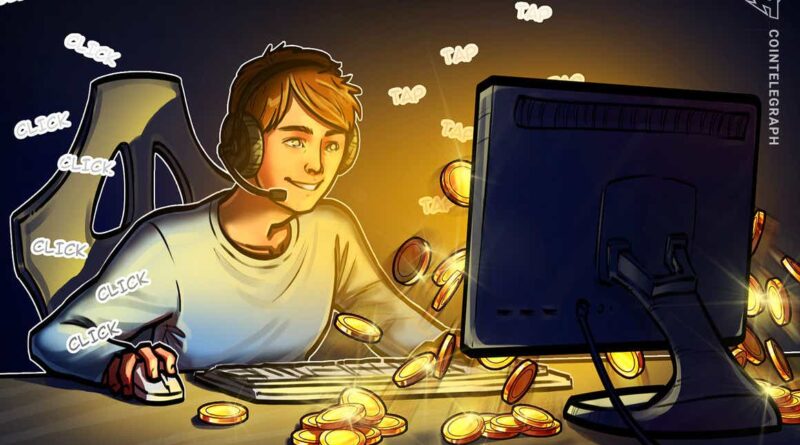Cointelegraph Research report analyzes GameFi’s bumper 2021 and trends for 2022
This March, Cointelegraph Research will release a 30-page report about GameFi — the term used to describe the marriage of blockchain-based games with decentralized finance (DeFi). The report analyzes five popular play-to-earn (P2E) games, the economics of GameFi and the future development of an industry responsible for more than 55% of all crypto transactions in the last quarter of 2021.
In collaboration with multiple partners including Konvoy Ventures, Game7, Forte, Animoca Brands and others, the Cointelegraph Consulting Research report will evaluate the strength of in-game economies, the GameFi industry’s future challenges and potential ways to overcome them.
The report dives into five popular P2E games and compares the titles on balance deposited, number of active users and volume of transactions. The games will also receive one to five scores for gameplay and tokenomics. Economic activity on GameFi exploded in 2021 and entire economies developed. This report explores the economics of digital economies. It makes a case for a free-market economic model based on strong property rights.
Visit the New Cointelegraph Research Terminal here to sign up for early access to the report.
Providing useful information about GameFi
You don’t need to be a seasoned pro to find nuggets of useful information in this report. The report gives a broad overview of the GameFi industry with easy-to-digest data on five of the most popular P2E games. You’ll find informative charts and analyses of important concepts relevant to the GameFi industry and how the early trailblazers developed in 2021. An example of the data you can expect is in the chart below:
The chart shows the balance players have invested (in USD) in each game, representing how much value players place on their in-game material. The number of daily active users (measured by unique wallet addresses) is shown over a 30-day moving average. Volume represents the daily amount of incoming value (USD) to the game. Finally, each game is scored for its gameplay and tokenomics factors.
Property rights online for the first time
Before GameFi, the game worlds didn’t let players genuinely own their in-game assets. GameFi stores in-game material as unique tokens as nonfungible tokens (NFTs) and lets owners sell them on free markets for a price of their choice. Crypto gaming has grown in popularity as players collect and trade virtual assets. This generated dependable income for the game developers at the same time that it created value for players.
In 2020, Axie Infinity gamers in the Philippines earned their regular monthly salary by just playing the game at a time when measures against the COVID-19 pandemic brought economic hardship to the country. The chart below shows Axie Infinity’s dominance in GameFi based on in-game NFT trading volume:
Axie Infinity was the first smash hit of 2021 on GameFi. All assets and data on Axie are open source and using it does not require permission from Axie’s developers, SkyMavis. Developers in the community can build what they want and let the player community decide whether they like it or not. In other words: A free and open market is baked into the game design.
Will 2022 be the Year of GameFi?
The five games’ rapid development is impressive, and 2022 promises to be a big year for P2E games. GameFi is changing the rules of gaming but is not without its share of challenges. Several regulatory concerns lie ahead for the industry. This report is an excellent source of information for anyone interested in GameFi. It showcases the superiority of open free trade over centrally planned economies.
This article is for information purposes only and represents neither investment advice nor an investment analysis or an invitation to buy or sell financial instruments. Specifically, the document does not serve as a substitute for individual investment or other advice.
Source: Read Full Article




